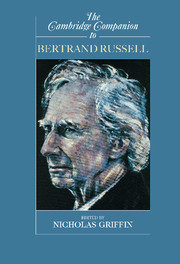Book contents
- Frontmatter
- Introduction
- 1 Mathematics in and behind Russell’s Logicism, and Its Reception
- 2 Russell’s Philosophical Background
- 3 Russell and Moore, 1898-1905
- 4 Russell and Frege
- 5 Bertrand Russell’s Logicism
- 6 The Theory of Descriptions
- 7 Russell’s Substitutional Theory
- 8 The Theory of Types
- 9 Russell’s Method of Analysis
- 10 Russell’s Neutral Monism
- 11 The Metaphysics of Logical Atomism
- 12 Russell’s Structuralism and the Absolute Description of the World
- 13 From Knowledge by Acquaintance to Knowledge by Causation
- 14 Russell, Experience, and the Roots of Science
- 15 Bertrand Russell
- Selective Bibliography
- Index
- Series list
2 - Russell’s Philosophical Background
Published online by Cambridge University Press: 28 May 2006
- Frontmatter
- Introduction
- 1 Mathematics in and behind Russell’s Logicism, and Its Reception
- 2 Russell’s Philosophical Background
- 3 Russell and Moore, 1898-1905
- 4 Russell and Frege
- 5 Bertrand Russell’s Logicism
- 6 The Theory of Descriptions
- 7 Russell’s Substitutional Theory
- 8 The Theory of Types
- 9 Russell’s Method of Analysis
- 10 Russell’s Neutral Monism
- 11 The Metaphysics of Logical Atomism
- 12 Russell’s Structuralism and the Absolute Description of the World
- 13 From Knowledge by Acquaintance to Knowledge by Causation
- 14 Russell, Experience, and the Roots of Science
- 15 Bertrand Russell
- Selective Bibliography
- Index
- Series list
Summary
Like many important philosophers around the turn of the last century, Russell came to philosophy from mathematics. From 1890 to 1893 he studied for Part I of the Cambridge Mathematical Tripos, as the Cambridge examination was called. That he started with mathematics was inevitable: all Cambridge students had to take either classics or mathematics for Part I of their degree, and Russell was neither good at, nor interested in, classics. Nonetheless, mathematics recommended itself to Russell for other reasons than necessity.
He went up to Cambridge with the hope of discovering what, if anything, could be known with certainty and with the conviction that, if anything could, it would be found in mathematics. These high hopes were rapidly dashed by the realities of the Tripos. The fact that so many students with differing interests had to take mathematics at Cambridge meant that the mathematics taught was relatively elementary and strongly oriented to physical application and geometrical intuition. Not that the Mathematical Tripos was easy; study for it was a relentless grind of practice in the solution of mathematically trivial, but fiendishly complicated, applications problems. The great developments of nineteenth-century mathematics, for example, in analysis and non-Euclidean geometry, and all the developments mentioned by Grattan-Guinness in his paper in this volume, were entirely ignored as unsuitable to the needs of most students. In particular, the nineteenth-century drive towards rigour and unification in mathematics was absent from Cambridge, which, despite its continuing high reputation in the subject, had become a mathematical backwater by the end of the century.
- Type
- Chapter
- Information
- The Cambridge Companion to Bertrand Russell , pp. 84 - 107Publisher: Cambridge University PressPrint publication year: 2003
- 4
- Cited by

